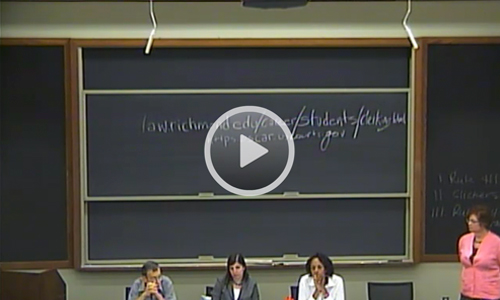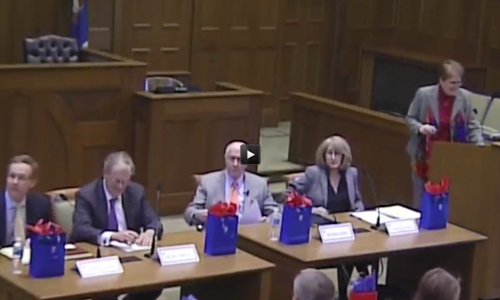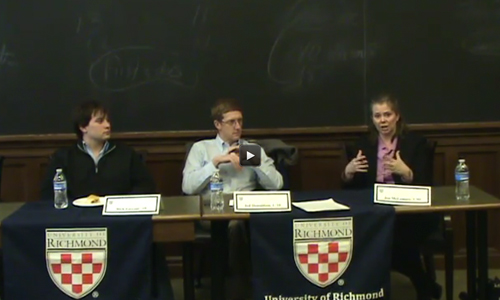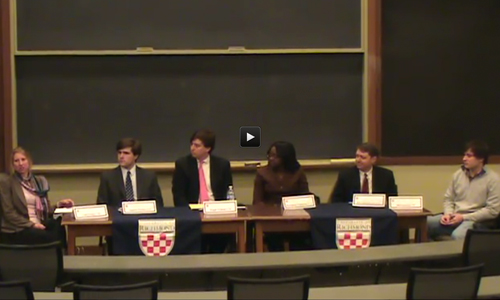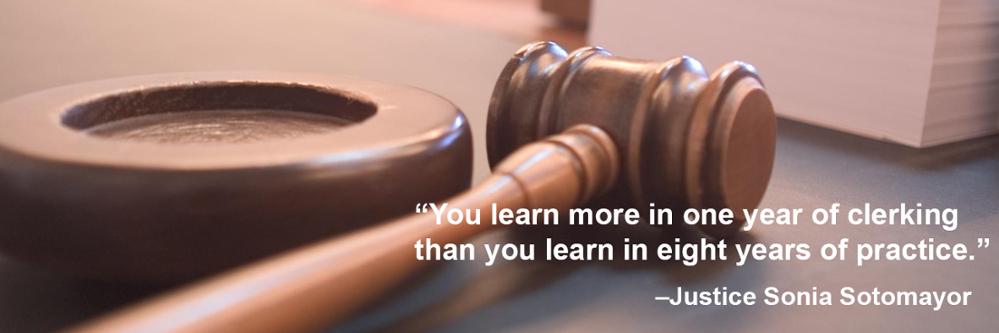
Judicial Clerkships
A judicial law clerk is a unique professional opportunity, resulting in a relationship with a judge that will have enduring value and be enormously satisfying. Richmond Law graduates have an enviable record of success, securing among the highest percentage of federal, state appellate, and state circuit court clerkships in the country.
Five Easy Steps to Apply
-
1. Familiarize yourself with the application process
(Summer between 1L and 2L year and Fall 2L year)
Review the resources on the Career Development Office’s clerkship website, including the Judicial Clerkships Handbook. After familiarizing yourself with the process, make an appointment to meet with the CDO judicial clerkship advisor to develop your individual clerkship application strategy. Also seek advice from Faculty Clerkship Committee members.
-
2. Secure your recommenders
(Summer entering 2L year and Fall 2L year)
Towards the end of your summer position, reach out to employers to ask for letters of recommendation. In the summer and fall, begin to reach out to faculty to ask for letters of recommendation. Most federal judges require two or three letters of recommendations (many students ask two faculty members and one employer to write letters). Secure your faculty recommenders early enough to give them sufficient time to write letters before you apply.
-
3. Prepare your application documents
(Fall and Spring 2L year)
Your resume and cover letter are considered by judges to be your first writing sample, and they must be perfect. Have them reviewed by your career advisor. Your writing sample may be something you wrote for Law Skills, something you wrote for an employer, or a case note or brief. Go over it with a fine-tooth comb. The work must be your own, but may incorporate comments from a professor. If written for an employer, gain permission before using it as a writing sample.
-
4. Research federal clerkships
(Spring 2L year and Summer before 3L year)
Federal Law Clerk Hiring Plan:
Class of 2024 students will gain access to OSCAR on January 9, 2023. With access, students will be able to register for an account, upload documents, search for clerkship positions, and build online applications. The system will store these applications and release them to judges on June 12, 2023. Check OSCAR for new positions frequently.Non-Plan Judges:
Beginning in January, apply to the federal judges in Richmond and elsewhere who are not participating in the Federal Law Clerk Hiring Plan. Consult with the judicial clerkship advisor to identify "Non-Plan Judges." Also review our spreadsheet of federal judges in Virginia for hiring practices (note: judges may change their schedules without notice). -
5. Research state clerkships
(Spring 2L year through Fall and Winter 3L year)
State appellate judges may begin their hiring process as early as January of your 2L year. State trial court judges usually begin their hiring process in July through October of your 3L year, though some may be earlier or later.
Resources
-
Applying and Interviewing
Guides
- Judicial Clerkships Handbook
- Richmond Law Alumni Clerks
- Richmond Law Alumni Judges
- How to Mail Clerkship Applications
- Tips for Non-Faculty Recommenders
- Clerkship Interview Summary Compilation
- Writing Sample Checklist and Guidelines
- Judicial Internships Guide
- Sample Judge List Spreadsheet
- FERPA Waiver Form
- Clerkship Interview Travel Reimbursement: Policy & Form
- Sample Writing Sample Cover Page
Videos
Clerkship Interest
Judges’ Perspectives
Bankruptcy Clerkships
Interviewing
-
Courts and Judges
Federal Judges
- Virginia Federal Judges Hiring Information
- Federal Administrative Law Judge Clerkships
- U.S. Courts
- Federal Judicial Center’s Biographical Guide to Judges
Virginia Judges
Other States’ Courts
